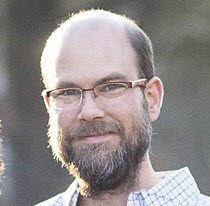Virology Expert Dr. Christopher Whitehurst Joins NYMC
College has a long history of being at the forefront of virology research

Further building on its strength in virology research, NYMC has recruited Christopher Whitehurst, Ph.D., who specializes in the study of the Epstein-Barr virus, to join the School of Medicine (SOM) and Graduate School of Basic Medical Sciences (GSBMS) as assistant professor of pathology, microbiology and immunology and of biochemistry and molecular biology.
“New York Medical College has a long history of being at the forefront of virology research through its involvement in the development of the influenza vaccine,” says Jerry L. Nadler, M.D., SOM dean and professor of pharmacology and medicine. “The addition of Dr. Whitehurst to our faculty will further solidify our strong reputation in this area and serve as an excellent mentor and role model for our students.”
“Nothing like a viral pandemic that crystalizes, more than ever, the importance of virology research to society,” says Marina Holz, Ph.D., GSBMS dean and professor of cell biology and anatomy. “We are delighted that Dr. Whitehurst will expand our research portfolio in this area, and are looking forward to welcoming him as a colleague.”
Dr. Whitehurst joined NYMC in January 2021 from the University of North Carolina at Chapel Hill (UNC), where he has been since 2006, first as a post-doctoral fellow and most recently as research assistant professor. He completed his bachelor’s degree in biochemistry at Clemson University, followed by a master’s in chemistry at the University of Wisconsin – Milwaukee, where he studied the vaccinia virus, which was used in the small pox vaccination. He earned his Ph.D. in biochemistry at North Carolina State University for studies of the syndbis virus, which causes syndbis fever in humans.
His work now focuses on the Epstein-Barr Virus (EBV), which is the causative agent of infectious mononucleosis and is associated with multiple forms of cancer, including Hodgkin’s lymphoma, Burkitt’s lymphoma and nasopharyngeal carcinoma, as well as acquired and innate immune disorders.
“Epstein-Barr Virus is a human tumor virus of the Herpesviridae family and infects approximately 90 percent of the world’s population,” says Dr. Whitehurst. “Patients who are immunosuppressed and have undergone bone marrow or solid organ transplant are at a significant risk of post-transplant lymphoproliferative disorder (PTLD). EBV is also pathogenically linked to Multiple Sclerosis. Despite this current and urgent unmet medical need, specific therapies for these EBV-triggered diseases do not currently exist.”
EBV encodes a deubiquitinating enzyme, BPLF1, which was discovered in 2005, and according to Dr. Whitehurst is proving to be increasingly important players in herpesviral infection. “Knockout of herpesviral deubiquitinating activity results in approximately 10-fold reduction in viral infection,” he says.
In his research, Dr. Whitehurst has identified viral and many cellular targets of BPLF1 deubiquitinating activity and examined its role in viral replication and DNA repair, demonstrating BPLF1’s importance for efficient production of infectious virus particles. “Studies involving infection of humanized mice found that loss of BPLF1 resulted in reduced tumorigenesis,” says Dr. Whitehurst. “Newer work has resulted in discovery of small molecule inhibitors of BPLF1 that were found to significantly reduce EBV infectivity. Inhibition of EBV’s DUB activity via BPLF1 is a promising new approach to specific therapy of EBV infections and related diseases.”
